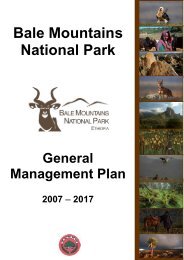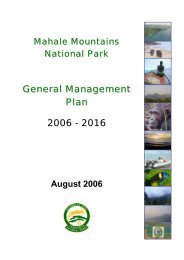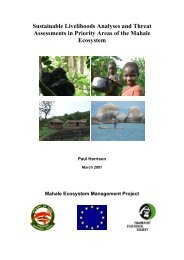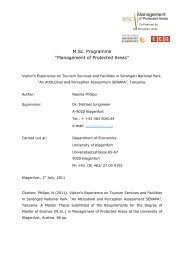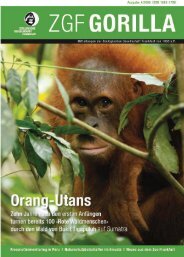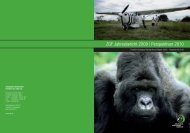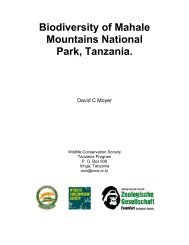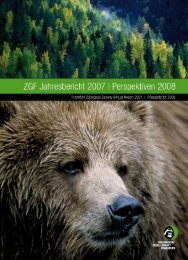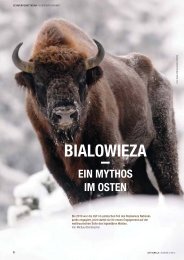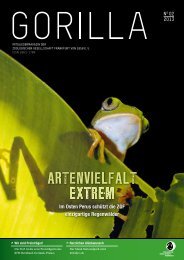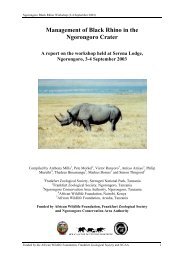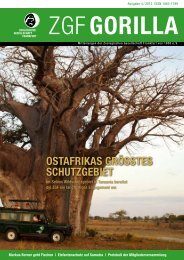Walia Special Edition on the Bale Mountains (2011) - Zoologische ...
Walia Special Edition on the Bale Mountains (2011) - Zoologische ...
Walia Special Edition on the Bale Mountains (2011) - Zoologische ...
Create successful ePaper yourself
Turn your PDF publications into a flip-book with our unique Google optimized e-Paper software.
anger based m<strong>on</strong>itoring system is a structured system of cataloguing important events that rangers<br />
are seeing in <strong>the</strong> field. There are a number of ways of collecting this informati<strong>on</strong>. CyberTracker<br />
offers a very nifty ic<strong>on</strong> driven palm pilot that rangers simply record what <strong>the</strong>y see as <strong>the</strong>y proceed<br />
<strong>on</strong> patrol. Garmin also offers a GPS-radio combinati<strong>on</strong> (called <strong>the</strong> Rino) that allows rangers to<br />
report events to a radio c<strong>on</strong>trol room, which automatically records <strong>the</strong> GPS locati<strong>on</strong> and time of <strong>the</strong><br />
observati<strong>on</strong>. Both <strong>the</strong>se opti<strong>on</strong>s are fairly expensive and for <strong>the</strong> 800USD that <strong>the</strong>se units typically<br />
cost you can buy an astounding number of pencils and patrol forms. Beware of falling into <strong>the</strong><br />
techno-trap.<br />
In <strong>the</strong> Serengeti, rangers collect informati<strong>on</strong> <strong>on</strong> daily patrol forms. Each patrol is issued a<br />
GPS unit with extra rechargeable batteries and a set of maps (<strong>the</strong> Garmin 72 is <strong>the</strong> easiest-to-use<br />
and most affordable GPS unit). The patrol form is printed in a carb<strong>on</strong>-copy booklet with tear-out<br />
triplicate sheets so that a copy of <strong>the</strong> patrol form can submitted as part of <strong>the</strong> m<strong>on</strong>thly reports from<br />
<strong>the</strong> ranger post. The most comm<strong>on</strong> events are recorded with a check, which means that <strong>the</strong> data are<br />
simple to collect but fairly crude – <strong>the</strong>y <strong>on</strong>ly indicate presence or absence. Important data, such as<br />
informati<strong>on</strong> about poachers’ camps, are collected as categorical and c<strong>on</strong>tinuous fields, and <strong>the</strong>refore<br />
provide more detail. The park is divided into a series of grids identified with an alpha-numeric<br />
and <strong>the</strong> patrol identifies which grids <strong>the</strong>y searched each day (e.g. A3, B3 and B4). This is an easy<br />
back-up system in case GPS’s fail or batteries die. In additi<strong>on</strong>, detailed informati<strong>on</strong> is also collected<br />
during an interview with arrested poachers. This informati<strong>on</strong> is designed to provide insights into<br />
why people poach in <strong>the</strong> park. The informati<strong>on</strong> suggests that poaching is a means of making m<strong>on</strong>ey<br />
especially for young men living near <strong>the</strong> park as <strong>the</strong>re are few alternative opti<strong>on</strong>s (Loibooki et al.<br />
2002). Appendix 4 has a sample ranger patrol form and poacher interview form.<br />
Interviews are notoriously messy data, which begs <strong>the</strong> questi<strong>on</strong> of data verificati<strong>on</strong>. A<br />
poacher could simply lie all <strong>the</strong> way through an interview and provide you with false informati<strong>on</strong>.<br />
One simple trick while c<strong>on</strong>ducting interviews is to ask <strong>the</strong> same questi<strong>on</strong> twice but in slightly<br />
different c<strong>on</strong>texts. For example, when a poacher is arrested with animal carcasses <strong>the</strong> rangers<br />
count <strong>the</strong> carcasses of each species. During <strong>the</strong> interview a few hours later, <strong>the</strong> poacher is asked<br />
how many carcasses <strong>the</strong>y had. Any discrepancy gives you a crude indicator of <strong>the</strong> data’s accuracy.<br />
Asking questi<strong>on</strong>s to which you already know <strong>the</strong> answer provides some indicati<strong>on</strong> of <strong>the</strong> informant’s<br />
reliability.<br />
Maintaining <strong>the</strong> Flow of Data<br />
A ranger based m<strong>on</strong>itoring system provides <strong>the</strong> structure for collecting data, but <strong>the</strong>re is no point in<br />
amassing it if it is not going to be used. The flow of informati<strong>on</strong> is just as important as collecting it.<br />
In fact, <strong>the</strong> informati<strong>on</strong> stream should be thought of as a busy multi-lane super highway.<br />
Informati<strong>on</strong> coming in from <strong>the</strong> field rangers should be analyzed and reported to <strong>the</strong><br />
managers, but it should not end <strong>the</strong>re. For a field patrol to see reports with maps, trends, and names<br />
of outstanding rangers provides a flattering sense of recogniti<strong>on</strong> and a huge moral boost. And<br />
<str<strong>on</strong>g>Walia</str<strong>on</strong>g>-<str<strong>on</strong>g>Special</str<strong>on</strong>g> <str<strong>on</strong>g>Editi<strong>on</strong></str<strong>on</strong>g> <strong>on</strong> <strong>the</strong> <strong>Bale</strong> <strong>Mountains</strong> 317



